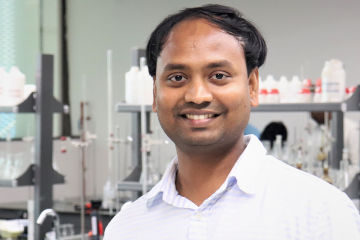Workshop on “Deep Learning-based Computer Vision and its Applications”
Dr Sandeep Singh Sengar, Assistant Professor, Department of Computer Science and Engineering, is organising a workshop for the enthusiasts on “Deep Learning-based Computer Vision and its Applications” on 19th and 20th June 2020 at 11 a.m. onwards.
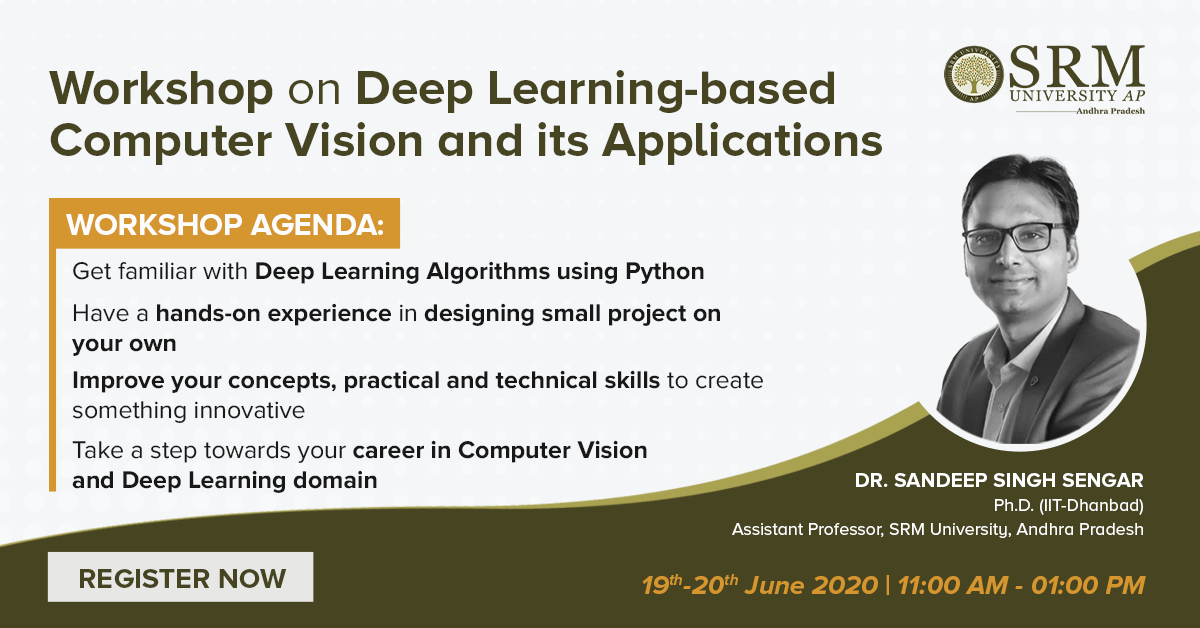
One of the main targets of Computer Vision is to interpret the content of Image and Video data. Machine/Deep learning is the science of designing and applying algorithms that can learn things from past cases. The workshop will focus on the concept and understanding of Image and Video Processing, Computer Vision and Deep Learning. In the workshop, participants will gain basic knowledge in the domains as well as hands-on experience in application and problem-solving. Attending the workshop will help participants immensely to come up with innovative ideas, but more importantly, they will have gained knowledge that could instantly set them apart from the crowd. The workshop is an excellent opportunity for those who want to build a career in this domain. In addition to that, research scholars, faculties or industry persons will also be benefitted from the action-oriented discussion and shared knowledge.
Registration Link: https://srmap.zoom.us/meeting/register/tJUvceuspzIrE9I0l6gBgvluSHgMXThsDOE1
- Published in CSE EVENTS, Events, Workshop
SRMAP’s contribution made SRMIST the No.1 private university in India
The very young SRM University-AP is already creating marvels by scaling new heights as a multidisciplinary research university. The 3-year-old university has published six very impactful research papers in a year in Nature Indexed journals. The notable research work helped significantly its sister aka principal institution SRM Institution of Science and Technology acquiring the rank of No.1 private university in India and 21 among Indian universities by the Nature Index 2020. The ranking was done based on Nature Index data from January 1st 2019 to December 31st 2019.
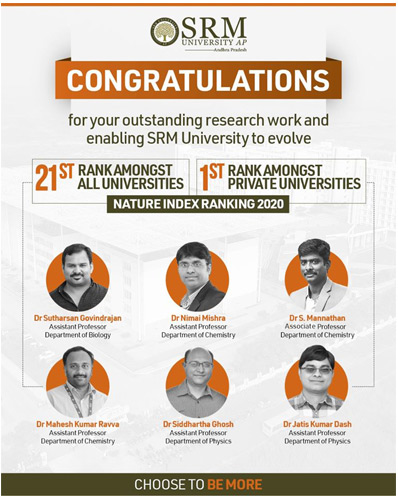
The Nature Index provides a perspective on high –quality research on the basis of published articles. The Nature Index provides a close to real-time proxy of high-quality research output and collaboration.
Nineteen research articles were published by the faculty members of SRMIST and its sister institutes between April 1st 2019 and March 31st 2020. These articles were compiled into a database by Nature Research to create the Nature Index rankings. Out of these nineteen articles, twelve were published by the Faculty Members of SRMIST, KTR Campus. One article was published by a faculty member of SRM University – Sikkim. The rest of the six articles were published by faculty members of SRM University- AP, Andhra Pradesh. Dr Sutharsan Govindrajan, Department of Biological Sciences; Dr Nimai Mishra, Dr S. Mannathan, Dr Mahesh Kumar Ravva, Department of Chemistry; Dr Siddhartha Ghosh and Dr Jatis Kumar Dash, Department of Physics played a pivotal role in achieving the honour for SRM University-AP. It is remarkable that SRM-AP, even in its budding stage, has contributed to around one third of the Nature Index score.
Dr Sutharsan’s paper, “A bacteriophage nucleus-like compartment shields DNA from CRISPR nucleases”, published in Nature, involves the discovery of novel strategies used by bacteriophages (viruses that kill bacteria) to overcome the bacterial CRISPR-Cas system, which are molecular scissors that are programmed to cut DNA. His findings have massive implications on the society as it has the ability to reshape the boundaries of the Phage-therapy in curing diseases.
Dr Mishra has published a paper titled “Broadband Defects Emission and Enhanced Ligand Raman Scattering in 0D Cs3Bi2I9 Colloidal Nanocrystals”. It is about excitonic 0D and 2D lead-halide perovskites that have been recently developed and investigated as new materials for light generation. In this work, a broadband (>1 eV) emission from newly synthesised 0D lead-free colloidal Cs3Bi2I9 nanocrystals (NCs) is reported. Remarkably, evidence of enhanced Raman scattering from the ligands is observed when attached to the NCs surface, an effect that is preliminarily attributed to strong exciton-ligands electronic coupling in these systems. Such interesting properties can be extremely appealing for a new class of low-cost materials suitable for solid-state lightning and sensing applications.
Dr Mannathan’s research article, “Palladium/Copper-Catalyzed Denitrogenative Alkylidenation and ortho-Alkynylation Reaction of 1,2,3-Benzotriazin-4(3H)-ones”, describes an environmentally friendly strategy to access various functionalised isoindolinones and 3-(imino)isobenzofuranones, which are important backbone in many natural products and biological active compounds. These reactions were enabled by an interesting Pd/Cu-cocatalyzed denitrogenative tandem alkynylation/cyclisation sequence. The strategy was also successfully employed to synthesise (Z)-3-benzylideneisobenzofuran-1(3H)-one derivatives in good to high yields.
Dr Mahesh’s paper is named “Harnessing Autoxidation of Aldehydes: In Situ Iodoarene Catalyzed Synthesis of Substituted 1,3,4-Oxadiazole, in the Presence of Molecular Oxygen”. In this study, a new methodology has been developed for the synthesis of substituted 1,3,4-oxadiazoles, which are essential pharmaceutical ingredients. We have modelled the reactivity of reactants, reactive intermediates, and products using computational protocols. Results obtained from these computational protocols are used to predict the reaction pathways and gain insights on the stability of products.
Dr Ghosh published “Direct Growth of Wafer-Scale, Transparent, p-Type Reduced-Graphene-Oxide-like Thin Films by Pulsed Laser Deposition”. His study reveals that reduced graphene oxide (rGO) is a derivative of widely used 2-D material called Graphene. Along with Graphene itself, rGO is also an exciting material for research communities due to its potential application in gas sensing, water purification and desalination, energy storage and flexible electronics. All these novel applications require a reproducible & scalable growth process for rGO thin films. In their research article, they have reported a single-step bottom-up growth process of reduced Graphene Oxide using a thin-film growth technique called Pulsed Laser Deposition (PLD). Utilising the state-of-the-art laser beam scanning technology, they have been able to grow 4-inch wafer-scale rGO thin-films with ultra-smooth surfaces and unparallel thickness uniformity. Moreover, they have found that these rGO thin-films are transparent and conducting with some of the lowest extinction coefficients and refractive index values. They believe this novel growth process combined with the exotic opto-electronic properties (of rGO) will enable us to directly grow and integrate rGO thin-films on Si & metal-oxide based hetero-structures and will potentially move forward the rapid deployment of rGO for various applications.
Dr Dash’s article is titled as “Thickness-Insensitive Properties of α-MoO3 Nanosheets by Weak Interlayer Coupling”. Extensive use of portable electronic products and the rapidly growing commercial markets in smart electric appliances have created a seemingly high demand for flexible, wearable and foldable high-performance photoelectric devices. In the search for new materials to meet these criteria, one promising solution may be the two-dimensional (2D) layered heterostructures, assembled by stacking different conventional 2D materials in hetero-layered architectures. Alpha (α) phase-molybdenum trioxide (MoO3) is one of the promising 2D oxides, which is a chemically stable semiconductor with a high dielectric constant. The high resistive tunnelling and dielectric constant also shows that α- MoO3 nanosheet can be used as a promising dielectric or tunnel barrier. Therefore, the epitaxially grown MoO3 can be an important candidate in the field of 2D materials-based nanoelectronics. α- MoO3 layers can also be used as dielectrics for supercapacitors, and channel materials for high power electronics. Besides these, heterojunctions like Graphene-α- MoO3 and α- MoO3 /MoS2 has its applications in Field effect transistors (FETs), battery cathode materials, and various sensors.
The Nature Index is a database of author affiliations and institutional relationships. The index tracks contributions to research articles published in 82 high-quality natural science journals, chosen by an independent group of researchers. This Index provides absolute and fractional counts of article publication at the institutional and national level and, as such, is an indicator of global high-quality research output and collaboration.
- Published in News
Department of Chemistry, SRM AP organizes webinar on “Chemistry is every day’s science”
Chemistry is often called the “CENTRAL SCIENCE” as it plays a pivotal role in all aspects of physical and biological sciences, including engineering, agriculture, medicine, and allied health disciplines. Department of Chemistry, SRM University-AP, Andhra Pradesh organizes a webinar titled “Chemistry is every day’s science” on 26 th June 2020 from 11.00 a.m. to 12.00 p.m. The session will provide high school students with opportunities to learn and interact with young faculty members who are genuinely passionate about chemistry. The webinar will illustrate the essentiality of chemistry in everyday life, and how its importance can ignite an interest in many young students to pursue a career in science.
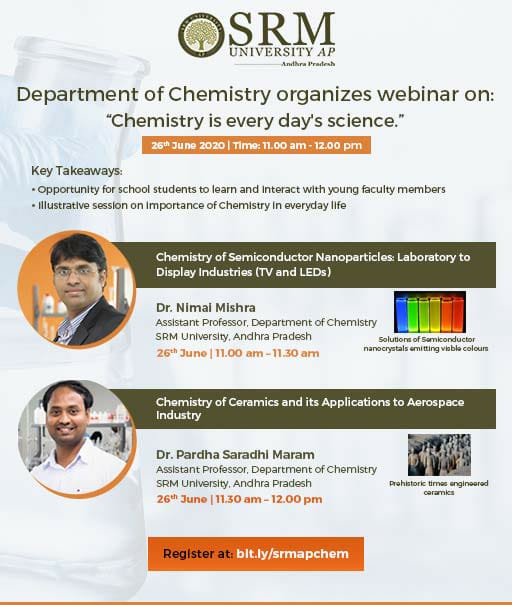

Solutions of Semiconductor nanocrystals emitting visible colours
Dr. Nimai Mishra, will be initiating the webinar as the first speaker. In the 30-minute duration of his talk beginning at 11 a.m., Dr. Mishra will be giving a speech on “Chemistry of Semiconductor Nanoparticles: Laboratory to Display Industries (TV and LEDs).” Semiconductor nanocrystals are tiny light-emitting particles on the nanometer scale, having optical and electronic properties that differ from larger particles due to quantum mechanics. Nanoparticles can be made in the Chemistry laboratory with the help of some simple chemical reactions. These semiconductor nanocrystals are valued for displays because they emit pure light, which can be used in electrical appliances (TV and LEDs) with visibly more accurate colours. In the talk, Dr. Mishra will discuss how simple Chemistry in the laboratory can contribute to making modern electrical appliances.
Presently (from November 2017), Dr. Mishra is working as an Assistant Professor in the Department of Chemistry at SRM University-AP, Andhra Pradesh. Before joining SRM-AP, he worked as a postdoctoral research scientist in the Department of Nanochemistry at the Italian Institute of Technology (IIT)-Genova, Italy. Prior to that, Dr. Mishra completed three years (April 2013 –June 2016) as a postdoctoral fellow in the Center for Integrated Nanotechnologies (CINT) at Los Alamos National Laboratory (LANL), USA. Dr. Mishra received his Ph.D. degree in March 2013 from the Department of Chemistry at the National University of Singapore (NUS), Singapore, and completed his M.Sc. in Chemistry from IIT-Madras.
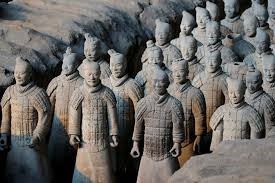
Prehistoric times engineered ceramics
Dr. Pardha Saradhi will begin his half an hour talk from 11.30 am. His speech will encompass “Chemistry of Ceramics and its Applications to Aerospace Industry.” Ceramics is one of the most ancient industries which has its roots going back thousands of years. Ceramics is a very general phrase; it includes a wide variety of materials that covers from decorative pottery to the aviation industry. Ceramics possess unique features and are identified by their properties such as high hardness, brittleness, chemical stability, and low thermal conductivity. After World War II, ceramics and glass have contributed to the growth of many technologically advanced fields, including electronics, optoelectronics, medical, energy, automotive, aerospace, and space exploration. The scheduled talk of Dr. Pardha Saradhi will focus on various ceramic materials and the chemistry behind making lightweight and high strength ceramics for the Aviation industry.
Dr. Maram Pardha Saradhi received a Ph.D. in Solid State Chemistry from the Department of Chemistry, Indian Institute of Technology, Madras. After postdoctoral work at the University of California, Dr. Pardha Saradhi moved to a catalyst industry where he headed diesel oxidation in the catalyst division. Later, he joined as the faculty in Chemistry at SRM University-AP, Andhra Pradesh. His research interests include Environment protection and Energy Conversion relating microscopic features of structure and bonding to macroscopic thermodynamic behaviour in complex functional materials. The main technical areas that his laboratory is working on is materials for Li-ion and beyond Li-ion batteries, mixed metal oxide catalysts for two-way and three-way emission control systems, and high-temperature ceramic materials for aerospace applications.
Registration Link: https://bit.ly/srmapchem
5G workshop in collaboration with IEEE-SRM Student Branch

Registration Link : https://bit.ly/srmapieee
Find the detailed Brochure here :

- Published in ECE Events, Events, Research Events, Research Workshop, Workshop
SRM AP’s collaboration with IIRS-ISRO enable students to avail outreach programmes
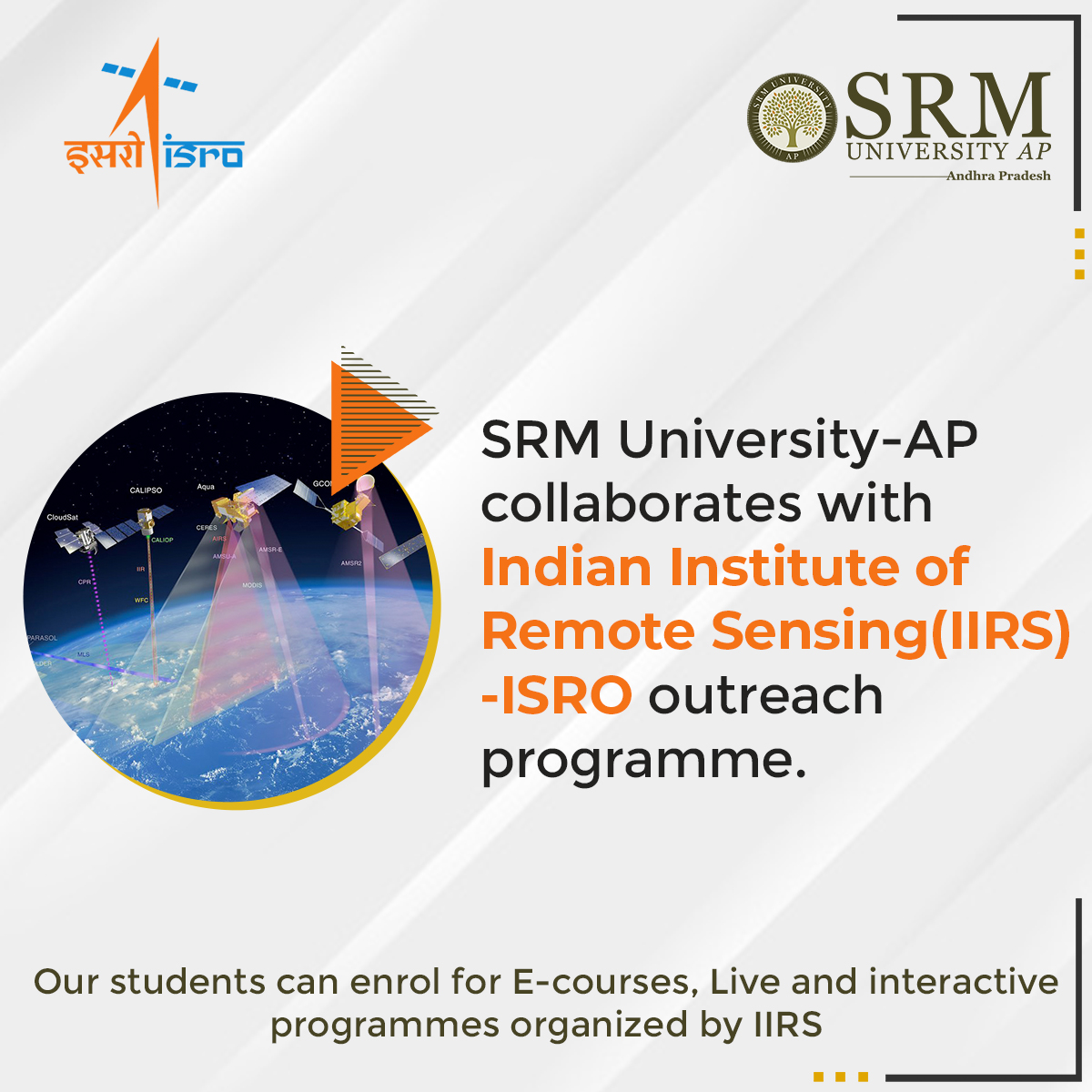 SRM University AP-Andhra Pradesh has collaborated with the Indian Institute of Remote Sensing (IIRS) -Indian Space Research Organization (ISRO)’s outreach programme. SRM AP is included among the top-notch universities of India that can benefit from the incomparable Outreach Programme. As part of the association, the students of SRM AP will have the excellent opportunity to register for annual courses as well as live and interactive programmes being organized by IIRS. In addition, E-learning courses for a short span of 3-4 Month duration will be accessible by the students.
SRM University AP-Andhra Pradesh has collaborated with the Indian Institute of Remote Sensing (IIRS) -Indian Space Research Organization (ISRO)’s outreach programme. SRM AP is included among the top-notch universities of India that can benefit from the incomparable Outreach Programme. As part of the association, the students of SRM AP will have the excellent opportunity to register for annual courses as well as live and interactive programmes being organized by IIRS. In addition, E-learning courses for a short span of 3-4 Month duration will be accessible by the students.
 Please view the annual course calendar 2020 here
Please view the annual course calendar 2020 here
ISRO is among the best-performing government organizations in India which has mastered the sophisticated space technologies, along with receiving applauds globally. The organization’s brilliant research and development, and applications for societal benefits like tele-education, telemedicine, disaster management, agriculture, fisheries and infrastructure development, ensures its dominance in the world. ISRO has launched the IIRS Outreach Programme to strengthen academia in terms of Space Technology & its applications through online learning platforms.
The popularity of remote sensing, geographical information system, global navigation satellite system and associated geospatial technologies in the current times require trained manpower in the domain. The students of SRM AP are encouraged to proactively avail the interactive distance learning courses and webinars that will enable the students to achieve their career goals in aerospace and geospatial technologies and make a mark globally.
Know more about Registration: https://elearning.iirs.gov.in/outreach.php
Register here: https://elearning.iirs.gov.in/Registration.php
 Click here to know more about the registration procedure
Click here to know more about the registration procedure
For additional information or clarification, please contact programme coordinator:
Prof. Siva Sankar Yellampalli
Professor of Practice & Head of the Department,
Department of Electronics and Communication Engineering
E-mail: sivasankar.y@srmap.edu.in
Contact No: 7760280268
Interactive session: Young achiever develops Face Shield at a price of INR 15
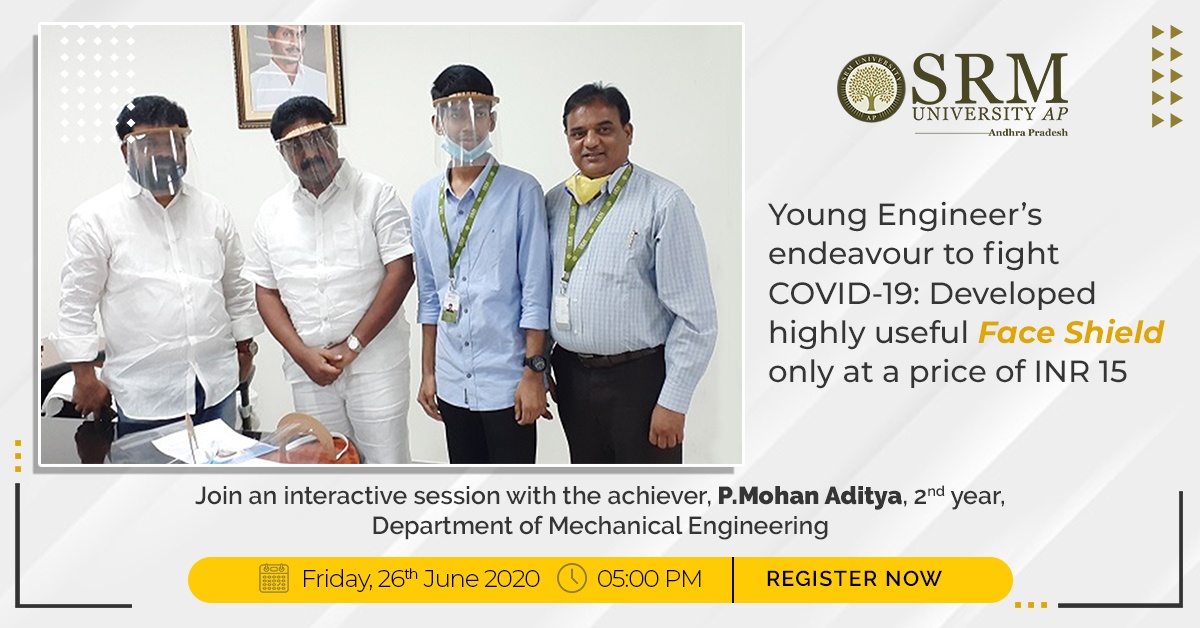
Registration Link : Click Here
For further details, visit:
https://srmap.edu.in/news/young-engineers-endeavour-fight-covid-19-developed-face-shield-2-0/
and
https://srmap.edu.in/news/ap-ministers-unveiled-face-shield-2-0-developed-srm-ap-student-mohan-aditya/
- Published in Events
“Contemporary Literary Review India” publishes “The War”: A Poetic Representation of the Eternal Struggle for Existence
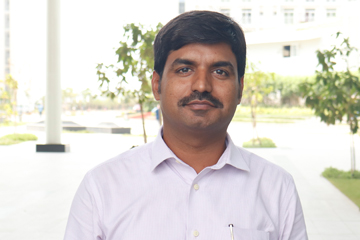 “He shines Hot, I absorb the heat intense;
“He shines Hot, I absorb the heat intense;
He comes down with all blaze, I disappear slow;
He boasts his victory Grand, roars High;
The world surrenders to his Will and Grace”
Dr Ram Kulesh Thakur’s poem titled ‘The War’ is a metaphoric poetic tale that depicts the strife and struggle of the human race against the challenges that question their identity and existence. The poem has been recently published in the reputed journal “Contemporary Literary Review India” in its May 2020 edition where it was avidly congratulated by the readers.
The poem ‘The War’ reflects the continuous state of turmoil that any sensible person faces each second, each day. One has to be mighty enough to deal with all the impediments and strive to better one’s life; not only for the personal benefit but at the same time for the entire Humanity. In the poem, the speaker, a tiny water droplet, dares to war against the imperious and despotic Sun and in the attempt loses its identity itself. However, the droplet does not lose hope. It makes an attempt to survive and joins others to form a cloud. The Cloud, as known, can fight gloriously and save the world from the intense heat of the Sun. Thus, the water droplet stands victorious. The poem reminds us of how determination and wisdom can eradicate all hindrances that lie in our paths. The poem teaches and inspires one to fight for good and never to give up until one succeeds.
Dr Thakur belongs to the school of thought that advocates “Art for Life’s Sake”; and therefore, he celebrates ‘life’ and illustrates his ‘day to day experiences’ in his creative write-ups. Whenever Dr Thakur can manage some time between his teaching duties as an Assistant Professor at the Department of English, he indulges in publishing both ‘Academic’ and ‘Creative’ write-ups in noted Journals and Newsletters such as Indian Book Chronicle, Poetcrit, Contemporary Literary Review India, Akshara. His natural inclination is towards the ‘Academic’ writing. Presently, two of his essays are under review to find its place in the most reputed international magazine ‘World Literature Today’.
Dr Thakur finds his inspirations in every author he reads, though celebrated authors Ruskin Bond, Haruki Murakami, Shashi Tharoor, Gita Hariharan, and Paulo Coelho hold a special place in his heart.
Dr Thakur has been working on two major and a few minor projects simultaneously. His latest creations, “Teaching English to Non-English”, a compilation of essays celebrating his personal ESL/EFL Classroom experiences; and “Shadow under the Shade”, a novella with 12 chapters, are expected to hit the bookstores by January 2021.
The ‘WAR’
– Dr Ram Kulesh Thakur
The arrogant Sun mocks my little stature,
Challenges my weak and fragile form;
I stand firm to show the worth of a pure Soul,
Prepare for the tussle Great;
He shines Hot, I absorb the heat intense;
He comes down with all blaze, I disappear slow;
He boasts his victory Grand, roars High;
The world surrenders to his Will and Grace;
At once, it grows dark, the birds chirp;
The delight to each floats on air,
They look to the Savior above:
To see a CLOUD, that was a water-drop.
Education is going online: 5 upsides from the move
COVID-19 stifled activity across the globe in an unprecedented manner. Most industries in almost all countries have been massively impacted but education was disproportionately impacted as schools, colleges, and universities shut down and remain subject to severe restrictions even as reopening begins.
However, given the importance of continuity workarounds were soon found and we now see several courses from secondary school education to post-graduate programs moving online. This has not happened only as a fall-out of the pandemic. Two critical factors are contributing to the spread and popularity of online education:
Need: All full-time courses are time-bound and suspension beyond a few days is not sustainable. Besides, students in on-going programs would prefer to stick to their schedule and be prepared with their qualifications in time for the post-pandemic economic revival.
Availability of resources: With widespread acceptance of laptop, computer and tablet for study along with the affordable data access are acting as catalyst for their learning. Rise of video conferencing tools like Zoom, Google Meet, Webex, skype etc made it fairly easy to connect students to classes and peers. All these resources have empowered their learning
The move has come with challenges. Nonetheless, everyone seems to have adjusted quickly and quite well to the new normal. This is thanks to several advantages, of which the most significant is that it keeps people at home and safe. Besides this, 5 primary advantages are:
- Reach: Online education obviously has a much wide reach as the constraint of classroom capacity is removed. This helps content and instruction from the same faculty size reach more students. SRM AP has proactively joined what might be the world’s largest remote learning experiment, collaborating with Zoom Platform where they host online classes. At present, over 40-60 classes are being conducted online daily.
- Recall: Webcams used in online sessions keep a focus on the student and a check on attention. Besides this, recordings of the session are usually available to quickly recap what has happened and students can also take screenshots of sessions for future reference. At SRM AP various LMS platforms – GSuite Classroom, Moodle, etc. are being used by the faculty to share the reading materials with the students.
- Extending use of media: Online classes at SRM AP use high end media to ensure continuous engagement between faculty and students. To make a classroom engaging, faculty members have started adding YouTube videos related to topics, diffusing knowledge through storytelling.
- Promoting reskilling and retooling: With rising joblessness and underemployment, there are several potential students across the world right now. They are keen to reskill and retool in a downturn so that they are well-equipped for the revival. Online education provides such students with depth and breadth in choices. Wider recognition of online courses by employers has also helped.
- Encouraging self-discipline and responsibility: Students have responded with a high degree of self-discipline in attending live classes and shown the responsibility to complete assigned course work despite the lack of supervision. The benefit of this obviously extends far beyond the completion of the program. It creates a value system that can benefit the students for the rest of their lives in all spheres.
Given the nature of this pandemic, online education is now not a matter of choice. And just as well – barring a few minor inconveniences (which too will be overcome with time, some effort and practice), this medium offers several advantages pandemic or no pandemic.
- Published in Blog, Innovation
SRM AP Students: Geared For The Post-COVID-19 Recovery
Economies and businesses have been in a constant state of flux and disruption, especially since the start of the 21st Century. Globalisation, technology, automation, and outsourcing are some of the factors that have contributed to this trend.
The COVID-19 pandemic has given new meaning to the term ‘disruption’! The world has literally changed from what it was merely 8-10 weeks ago. As the world looks towards a reopening and recovery, skill sets, ways of working, methods of collaboration, and urgent economic needs…everything will undergo a transformation and will require significant adjustments from everyone.
At SRM University, Andhra Pradesh we have always focused on imbibing skills sets in our students that can help them compete and contribute effectively in a dynamic world. This approach comprises of several distinct interventions that are embedded into what is taught and how it is taught, including:
Selection Process
The University follows a high technical qualification standard for students applying to either School of Engineering and Applied Sciences (SEAS) and School of Liberal Arts and Basic Sciences (SLABS). There is equal emphasis on the personal interview process also. This process looks for achievers and keen learners who display both a strong track record of achievement as well as a desire to grow through learning. Besides this, we maintain a standard of diversity in the batches, which serves as a source of learning as well as preparation for the diversity seen in real life.
Liberal Arts Education
All SEAS and SLABS courses have common emphasis on liberal arts education. This approach towards higher education consists of a focus on four primary areas: the natural sciences, social sciences, arts, and humanities. The approach towards teaching all subjects is a blended one wherein influences from one sphere are used in another. This is useful since real life problems do not come compartmentalised and their solutions usually draw upon other apparently unrelated areas. Eg. a production constraint in operations that needs to be optimised through the labour force will need to employ an understanding of psychology. Or take the example of biomechanics, which draws upon medicine, biology, and robotics. At SRM University, Andhra Pradesh our inter-disciplinary programs facilitate flexibility in learning, which ultimately leads to broad thinkers with depth in their chosen field. Our six foundation courses across all our undergraduate program enable critical thinking and encourage becoming a thought leader. More formally, our students can opt for Minors in completely unrelated areas to broaden their knowledge and explore personal interests.
Experiential Learning
“Tell me and I forget. Teach me and I will remember. Involve me and I learn” – Benjamin Franklin.
Students have a real need and desire for applying their learning. At SRM University, Andhra Pradesh various initiatives such as industry-driven Undergraduate Research Opportunities (UROP), capstone projects, industry internships and a technology-enabled active learning environment enable our students to implement their learnings in real life settings. This enables them to prepare for complex problems right from the undergrad level.
Special Modules
Initiatives and modules such as FabLab, Next Tech Lab, and IDEA provide our students with a novel and hands-on learning experience. While the emphasis is on theory, the ultimate objective is problem solving abilities. Needless to say, the world is going to need more problem solvers and fewer theorizers in challenging times. Students also have an option in their 4th year to undertake certificate or diploma programs in India or abroad.
International Exposure
Besides this, several international collaborations provide our students with valuable opportunities to benefit from some of the premier institutions in the USA and other countries. In a world unified against a common threat, world-class international exposure will go a long way in preparing professionals for the challenges ahead.
These are only some of the specific initiatives at SRM University, Andhra Pradesh targeted at providing students with not just a degree, but an education. Making them not just job seekers, but real thinkers.
- Published in Blog, Innovation
Synthesis of highly emissive and color tuanble CsPbBr3 Perovskite Nanocrystals via simple anion exchange
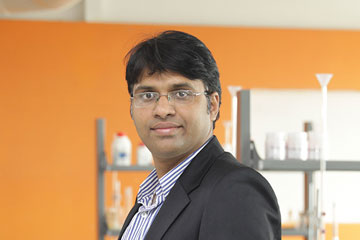 Dr. Nimai Mishra, Assistant Professor, Department of Chemistry, along with his research group comprising of his Ph.D. students Ms. V.G.Vasavi Dutt and Mr. Syed Akhil have published their recent work on “Fast, Tunable and Reversible Anion-Exchange in CsPbBr3 Perovskite Nanocrystals with Hydrohalic Acids” in the Journal “CrystEngComm”, Royal Society of Chemistry with an Impact factor 3.38.
Dr. Nimai Mishra, Assistant Professor, Department of Chemistry, along with his research group comprising of his Ph.D. students Ms. V.G.Vasavi Dutt and Mr. Syed Akhil have published their recent work on “Fast, Tunable and Reversible Anion-Exchange in CsPbBr3 Perovskite Nanocrystals with Hydrohalic Acids” in the Journal “CrystEngComm”, Royal Society of Chemistry with an Impact factor 3.38.
 Cesium-lead-halide perovskite nanocrystals In the research work, Dr. Mishra’s group has developed a very simple facile synthesis process of perovskite nanocrystals with very high emissive properties and colour tunability. Colloidal caesium-lead-halide perovskite nanocrystals (NCs) (CsPbX3, X = Cl, Br, I) are presently on-demand because of their excellent photoluminescence quantum yield (PLQY), wide range of band gap tunability and defect tolerance, finding its application as photodetectors, light-emitting diodes (LEDs), asing, and photovoltaics. Dr. Mishra informs, “Anion ( the halides) exchange in colloidal caesium-lead- halide perovskite nanocrystals (NCs) is a highly efficient protocol to tune their chemical composition and optoelectronic properties. In this work, we first report the use of hydrohalic acids (HX; X=Cl and Br) as a precursor for anion exchange which can be an efficient way to control the composition and optical properties of CsPbBr3 perovskite nanocrystals (NCs).” Furthermore, the team demonstrated a facile and efficient approach of anion-exchange which is implemented to tune the optical properties of CsPbX3 perovskite NCs via a simple post-synthetic modification with hydrohalic acids. Importantly, this work presents a simple, feasible, reproducible synthetic route toward control halide exchange in metal halide perovskite NCs with various optoelectronic properties.
Cesium-lead-halide perovskite nanocrystals In the research work, Dr. Mishra’s group has developed a very simple facile synthesis process of perovskite nanocrystals with very high emissive properties and colour tunability. Colloidal caesium-lead-halide perovskite nanocrystals (NCs) (CsPbX3, X = Cl, Br, I) are presently on-demand because of their excellent photoluminescence quantum yield (PLQY), wide range of band gap tunability and defect tolerance, finding its application as photodetectors, light-emitting diodes (LEDs), asing, and photovoltaics. Dr. Mishra informs, “Anion ( the halides) exchange in colloidal caesium-lead- halide perovskite nanocrystals (NCs) is a highly efficient protocol to tune their chemical composition and optoelectronic properties. In this work, we first report the use of hydrohalic acids (HX; X=Cl and Br) as a precursor for anion exchange which can be an efficient way to control the composition and optical properties of CsPbBr3 perovskite nanocrystals (NCs).” Furthermore, the team demonstrated a facile and efficient approach of anion-exchange which is implemented to tune the optical properties of CsPbX3 perovskite NCs via a simple post-synthetic modification with hydrohalic acids. Importantly, this work presents a simple, feasible, reproducible synthetic route toward control halide exchange in metal halide perovskite NCs with various optoelectronic properties.
Regarding the future scope of the research, Dr. Mishra informs, “These high-quality nanocrystals have the potential to be used as active material in LED devices, therefore our future plan is to make a prototype LED devices using our nanocrystals.”
Dr. Nimai Mishra is keen to collaborate, interested researchers may kindly contact him at nimai.m@srmap.edu.in
- Published in Research News


